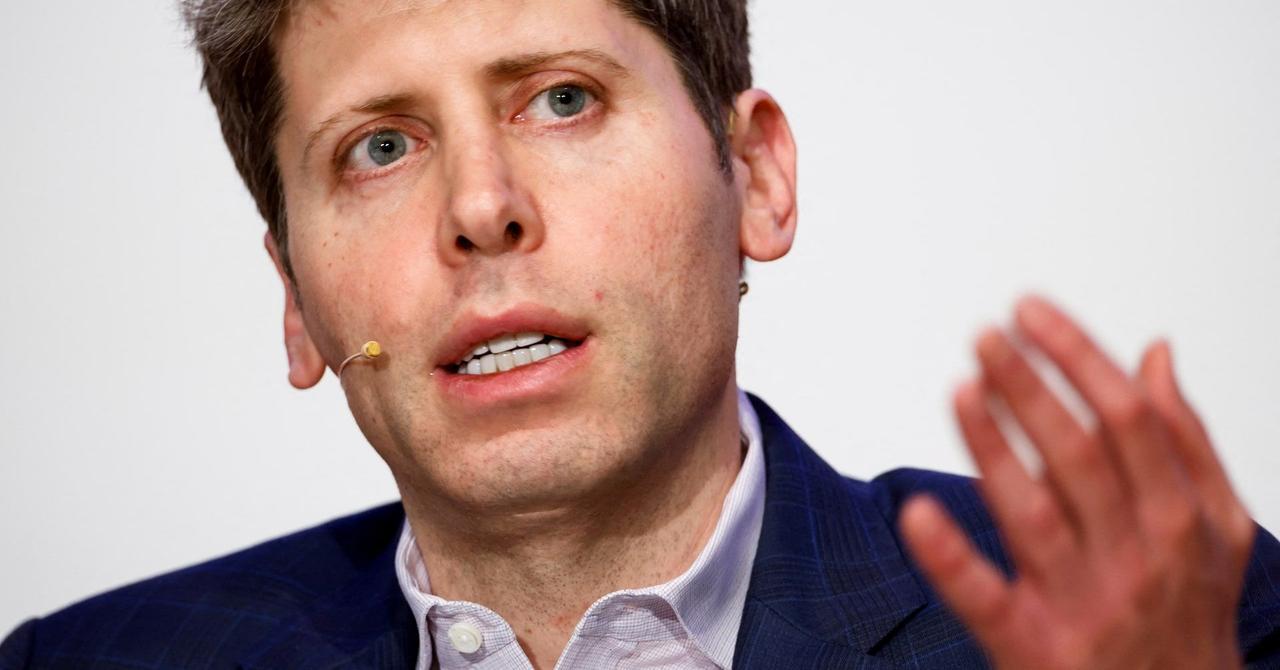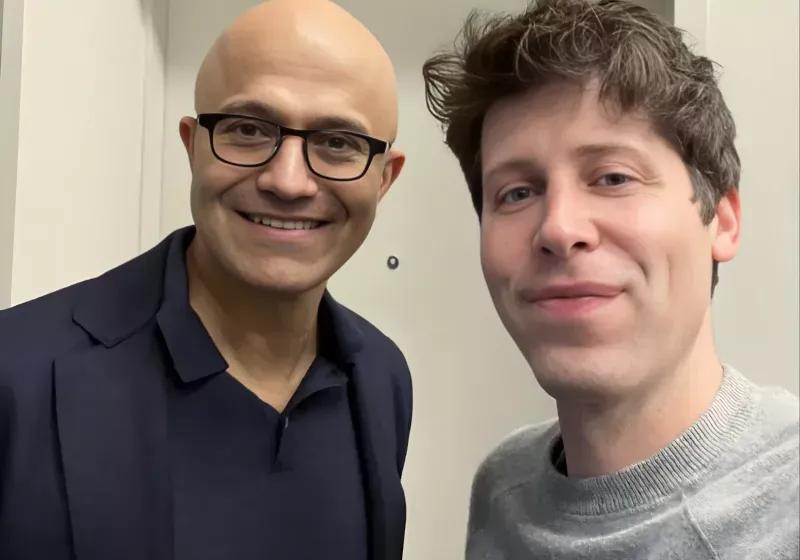OpenAI CEO Sam Altman Discusses Future Partnership with Microsoft and AI Developments
5 Sources
5 Sources
[1]
OpenAI CEO Altman says he spoke with Microsoft CEO about future partnership, NYT reports
June 24 (Reuters) - OpenAI chief executive Sam Altman had a call with Microsoft (MSFT.O), opens new tab CEO Satya Nadella on Monday and discussed their future working partnership, Altman said in a New York Times podcast on Tuesday. Earlier this month, the Wall Street Journal reported that Microsoft, the AI startup's major backer, and OpenAI are discussing revising the terms of Microsoft's investment, including the future equity stake it will hold in the startup. The Financial Times has reported that Microsoft is considering pausing discussions with OpenAI if the two sides remain unable to agree on critical issues such as the size of Microsoft's future stake. Microsoft and OpenAI did not immediately respond to Reuters' request for comment outside regular business hours. "Obviously in any deep partnership, there are points of tension and we certainly have those," Altman told the NYT. "But on the whole, it's been like really wonderfully good for both companies." Altman also said that he had productive talks with U.S. President Donald Trump on artificial intelligence and credited him with understanding the geopolitical and economic importance of the technology. In January, Trump announced Stargate, a private sector investment of up to $500 billion for AI infrastructure, funded by SoftBank (9984.T), opens new tab, OpenAI and Oracle (ORCL.N), opens new tab. Reporting by Rishabh Jaiswal in Bengaluru; Editing by Mrigank Dhaniwala Our Standards: The Thomson Reuters Trust Principles., opens new tab Suggested Topics:Technology
[2]
Takeaways from Hard Fork's interview with OpenAI's Sam Altman
OpenAI CEO Sam Altman praised Donald Trump's grasp of AI's geopolitical and economic importance, highlighting their collaboration on a $100 billion AI project. In a podcast, Altman discussed AI's impact on jobs, regulation challenges, competition for talent, and reassured on OpenAI's partnership with Microsoft amid reported tensions. Sam Altman, the chief executive of artificial intelligence company OpenAI, said Tuesday that he has had productive talks with President Donald Trump about AI and credited him with understanding the geopolitical and economic importance of the technology. "I think he really gets it," Altman said. He added, "I think he really understands the importance of leadership in this technology." Altman, 40, made his remarks about Trump during a live interview in San Francisco with "Hard Fork," the tech podcast from The New York Times. Over the 30-minute conversation, Altman and Brad Lightcap, OpenAI's chief operating officer, discussed AI's effect on jobs, the grab for technological talent by Meta's Mark Zuckerberg and regulatory and safety concerns about the fast-evolving and powerful technology. (The Times has sued OpenAI and its partner, Microsoft, accusing them of copyright infringement of news content related to AI systems. OpenAI and Microsoft have denied those claims.) Here are some of the takeaways. On Trump Altman has made it a point to forge a relationship with Trump. The day after the president's inauguration in January, Altman stood behind Trump in the White House's Roosevelt Room as Trump announced a $100 billion AI infrastructure deal, called Stargate, which was backed by OpenAI, SoftBank and Oracle. Trump described it as the "largest AI infrastructure project by far in history." On Tuesday, Altman said Trump understood AI and "the potential for economic transformation, sort of geopolitical importance, the need to build a lot of infrastructure." How AI is affecting jobs Fears over how artificial intelligence could replace humans in jobs have loomed for years. More recently, there have been signs that some employers may be starting to use AI for entry-level jobs instead of hiring young graduates. Lightcap said he concurred with predictions that AI would change jobs. "I think that there is going to be some sort of change," he said. "I think it's inevitable. I think every time you get a platform shift, you get the changing job market." Altman added that history suggested that better tools -- in this case, artificial intelligence -- would lead to more efficiency and people living richer lives. Regulatory and safety concerns Altman affirmed that there was a need to regulate AI but said it would be difficult to offer services if regulations varied by states. "As these systems get quite powerful, we clearly need something," he said. "And I think something around the really risky capabilities and ideally something that can be quite adaptive and not like a law that survives 100 years." His comments added to a debate over how governments should treat artificial intelligence. During the Biden administration, Altman and other tech executives said they believed in regulation of AI, though no laws were passed. Trump has taken a more laissez-faire attitude toward potentially regulating the technology. Lawmakers recently included a 10-year ban on AI regulation in Trump's domestic policy bill. "I have become a bit more, jaded isn't the right word, but it's something in that direction, about the ability of policymakers to grapple with the speed of technology," Altman said. Fight for AI talent Silicon Valley has been agog in recent weeks over how Meta, which owns Facebook, Instagram and WhatsApp, has been spending big to hire AI talent. Zuckerberg steered Meta's $14.3 billion investment in the AI startup Scale AI and hired its 28-year-old chief executive, Alexandr Wang, to join a new lab that is pursuing "superintelligence," a theoretically powerful form of AI that could exceed the human brain. Zuckerberg has also dangled nine-figure pay packages to attract other technologists to Meta. In the interview with "Hard Fork," Altman seemed unbothered by the rivalry. When Lightcap was asked if he thought Zuckerberg really believed Meta would develop "superintelligence" or if it was just a recruiting tactic, Lightcap replied, "I think he believes he's superintelligent." OpenAI's relationship with Microsoft Microsoft is OpenAI's biggest investor, pumping billions of dollars into the AI company. But there have been reports since last year that the relationship between the companies has soured. "Do you believe that, when you read those things?" Altman said in answer to questions about the relationship. He added that he had a "super nice call" with Satya Nadella, Microsoft's chief executive, Monday and that they discussed their future of working together. "Obviously in any deep partnership, there are points of tension, and we certainly have those," Altman said. "But on the whole, it's been like really wonderfully good for both companies."
[3]
Sam Altman Crushes OpenAI-Microsoft Feud Rumors, Hails 'Really Wonderfully Good' Bond With Satya Nadella - Microsoft (NASDAQ:MSFT), Meta Platforms (NASDAQ:META)
In a recent interview, Sam Altman, the CEO of OpenAI, addressed the ongoing tensions with Microsoft MSFTand the recruitment efforts by Meta Platforms Inc. META. What Happened: On The Hard Fork, The New York Times' tech podcast, Altman confirmed that Microsoft, OpenAI's largest investor, continues to back the AI company amid rumors of a strained relationship. Altman disclosed that he had a "super nice call" with Microsoft's CEO, Satya Nadella, where they discussed their future collaboration. He admitted to some points of tension but stressed that the partnership has been "really wonderfully good" for both parties. Altman also addressed the recruitment efforts by Meta, led by CEO Mark Zuckerberg. Meta has reportedly extended nine-figure compensation packages to lure top technologists from OpenAI and other firms. When asked about Zuckerberg's belief in Meta's potential to develop "superintelligence," Altman's COO, Brad Lightcap, replied, "I think he believes he's super intelligent." SEE ALSO: US Tests Radar That Could Help Trump's Golden Dome Detect Missiles Over 1,200 Miles: Report Why It Matters: The relationship between OpenAI and Microsoft has been under scrutiny for some time. OpenAI was considering accusing Microsoft of anticompetitive practices, a move that could potentially strain their long-standing partnership. Meanwhile, Meta's aggressive recruitment tactics have also been in the spotlight. Meta offered $100 million compensation packages to lure top OpenAI talent, but Altman stated that the company's best people are staying put because they believe more in achieving AGI. The developments in the relationships between OpenAI, Microsoft, and Meta could have significant implications for the future of AI development and the tech industry as a whole. On a year-to-date basis, shares of Microsoft soared 17.09%, while Meta surged 18.85%, as per Benzinga Pro. READ MORE: Microsoft's AI Gets $80 Billion -- While Pink Slips Print By The Thousand Image via Shutterstock Disclaimer: This content was partially produced with the help of AI tools and was reviewed and published by Benzinga editors. METAMeta Platforms Inc$714.320.30%Stock Score Locked: Want to See it? Benzinga Rankings give you vital metrics on any stock - anytime. Reveal Full ScoreEdge RankingsMomentum85.45Growth92.41Quality87.52Value25.91Price TrendShortMediumLongOverviewMSFTMicrosoft Corp$492.250.44%Market News and Data brought to you by Benzinga APIs
[4]
OpenAI CEO Altman says he spoke with Microsoft CEO about future partnership, NYT reports
OpenAI chief executive Sam Altman had a call with Microsoft CEO Satya Nadella on Monday and discussed their future working partnership, Altman said in a New York Times podcast on Tuesday. Earlier this month, the Wall Street Journal reported that Microsoft, the AI startup's major backer, and OpenAI are discussing revising the terms of Microsoft's investment, including the future equity stake it will hold in the startup. The Financial Times has reported that Microsoft is considering pausing discussions with OpenAI if the two sides remain unable to agree on critical issues such as the size of Microsoft's future stake. Microsoft and OpenAI did not immediately respond to Reuters' request for comment outside regular business hours. "Obviously in any deep partnership, there are points of tension and we certainly have those," Altman told the NYT. "But on the whole, it's been like really wonderfully good for both companies." Altman also said that he had productive talks with U.S. President Donald Trump on artificial intelligence and credited him with understanding the geopolitical and economic importance of the technology. In January, Trump announced Stargate, a private sector investment of up to US$500 billion for AI infrastructure, funded by SoftBank, OpenAI and Oracle. ---
[5]
OpenAI CEO Altman says he spoke with Microsoft CEO about future partnership, NYT reports
(Reuters) -OpenAI chief executive Sam Altman had a call with Microsoft CEO Satya Nadella on Monday and discussed their future working partnership, Altman said in a New York Times podcast on Tuesday. Earlier this month, the Wall Street Journal reported that Microsoft, the AI startup's major backer, and OpenAI are discussing revising the terms of Microsoft's investment, including the future equity stake it will hold in the startup. The Financial Times has reported that Microsoft is considering pausing discussions with OpenAI if the two sides remain unable to agree on critical issues such as the size of Microsoft's future stake. "Talks are ongoing and we are optimistic we will continue to build together for years to come," Microsoft and OpenAI said in a joint statement. "Obviously in any deep partnership, there are points of tension and we certainly have those," Altman told the NYT. "But on the whole, it's been like really wonderfully good for both companies." Altman also said that he had productive talks with U.S. President Donald Trump on artificial intelligence and credited him with understanding the geopolitical and economic importance of the technology. In January, Trump announced Stargate, a private sector investment of up to $500 billion for AI infrastructure, funded by SoftBank, OpenAI and Oracle. (Reporting by Rishabh Jaiswal and Anusha Shah in Bengaluru; additional reporting by Juby Babu in Mexico City; Editing by Mrigank Dhaniwala and Shinjini Ganguli)
Share
Share
Copy Link
OpenAI CEO Sam Altman confirms ongoing partnership with Microsoft, discusses AI's impact on jobs, and reveals productive talks with President Trump about AI infrastructure investments.
OpenAI and Microsoft: A Continuing Partnership
OpenAI CEO Sam Altman has addressed rumors of tension between his company and its major backer, Microsoft. In a New York Times podcast interview, Altman revealed that he had a "super nice call" with Microsoft CEO Satya Nadella on Monday, discussing their future collaboration
1
. Despite acknowledging some "points of tension" in their deep partnership, Altman emphasized that the relationship has been "really wonderfully good for both companies"2
.
Source: Reuters
This statement comes amid reports from the Wall Street Journal that Microsoft and OpenAI are in discussions to revise the terms of Microsoft's investment, including the future equity stake in the startup
3
. In a joint statement, Microsoft and OpenAI said, "Talks are ongoing and we are optimistic we will continue to build together for years to come"5
.AI's Impact on Jobs and Regulation
During the interview, Altman and OpenAI's COO Brad Lightcap discussed the potential effects of AI on the job market. Lightcap concurred with predictions that AI would change jobs, stating, "I think that there is going to be some sort of change. I think it's inevitable"
2
.Altman addressed the need for AI regulation but highlighted the challenges of implementing effective policies. He expressed some skepticism about policymakers' ability to keep pace with rapidly evolving technology, saying, "I have become a bit more, jaded isn't the right word, but it's something in that direction, about the ability of policymakers to grapple with the speed of technology"
2
.Collaboration with President Trump and the Stargate Project
In a surprising revelation, Altman praised President Donald Trump's understanding of AI's geopolitical and economic importance. He mentioned having productive talks with Trump about artificial intelligence, stating, "I think he really gets it. I think he really understands the importance of leadership in this technology"
2
.This collaboration led to the announcement of the Stargate project in January, a massive private sector investment of up to $500 billion for AI infrastructure. The project is funded by SoftBank, OpenAI, and Oracle
4
. Altman described it as the "largest AI infrastructure project by far in history"2
.
Source: Market Screener
Related Stories
Competition in the AI Landscape
The interview also touched on the intense competition for AI talent in Silicon Valley. Meta, led by Mark Zuckerberg, has been aggressively recruiting AI experts with reported nine-figure compensation packages. When asked about Zuckerberg's belief in developing "superintelligence" at Meta, Lightcap quipped, "I think he believes he's superintelligent"
2
.
Source: ET
As the AI landscape continues to evolve rapidly, the relationships between major players like OpenAI, Microsoft, and Meta, as well as government involvement in AI development, will likely shape the future of this transformative technology.
References
Summarized by
Navi
Related Stories
Microsoft and OpenAI: From Allies to Potential Rivals in the AI Race
29 Apr 2025•Business and Economy

Sam Altman Predicts AGI by 2025, Warns of Superintelligence Impact
06 Dec 2024•Technology

Microsoft and OpenAI's Partnership Shows Signs of Strain Amid Financial Pressures and Strategic Shifts
18 Oct 2024•Business and Economy

Recent Highlights
1
Google Gemini 3.1 Pro doubles reasoning score, beats rivals in key AI benchmarks
Technology

2
Meta strikes up to $100 billion AI chips deal with AMD, could acquire 10% stake in chipmaker
Technology

3
Pentagon threatens Anthropic with supply chain risk label over AI safeguards for military use
Policy and Regulation





